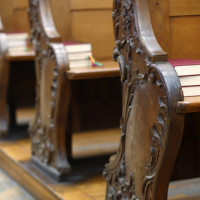New Jersey Charitable Immunity Act Protects Church from Liability in Slip and Fall Injury Case

Earlier this month, the Superior Court of New Jersey, Appellate Division, upheld the trial court’s decision to dismiss a plaintiff’s slip and fall personal injury case. The decision to dismiss the case was based on New Jersey’s Charitable Immunity Act, a law which exempts religious organizations from liability for negligence which injures a person who is a beneficiary of the organization’s works.
The accident occurred on January 4, 2010, during an ushers’ council meeting at the Jerusalem Baptist Church. An ushers’ council meeting is a periodic gathering of ushers and other officers of the church, and qualifies as a religious activity under the New Jersey Charitable Immunity Act. The plaintiff had driven her mother to the church and dropped her off there to attend the meeting. The plaintiff later returned to the church to be with her mother, when she slipped and fell while descending the stairs to the church basement where the meeting was being held.
The injured woman sued the church, and the church filed a motion for summary judgment, asking the court to dismiss the case based on the Charitable Immunity Act. Although it was admitted that the ushers’ meeting was a charitable event covered by the Act, the plaintiff argued that she was not a beneficiary of the event, since she was not participating in the meeting or benefiting from it but only taking her mother to the meeting.
The Act grants immunity to churches for injuries that occur during a religious activity to persons who are “direct recipients of those good works.” It has been held that parents who are not participating in an activity but are taking their children to the activity are considered beneficiaries of the activity. In this case, the church argued that an adult child who accompanies an elderly parent is in the same position as a parent accompanying a child, and therefore should be considered a beneficiary of the activity, even if not actively participating. The judge agreed and granted summary judgment in favor of the defendant church.
The appeals court also agreed and upheld the dismissal in its opinion in Pollard v. Jerusalem Baptist Church. The court noted that the Act by its own terms says it is to be liberally construed in favor of protecting religious institutions and granting them immunity from civil lawsuits for negligence.

